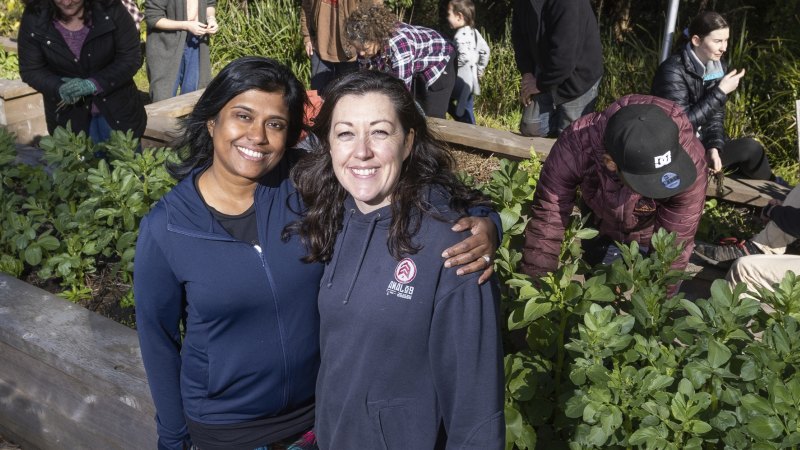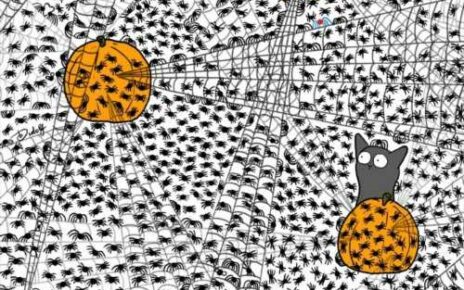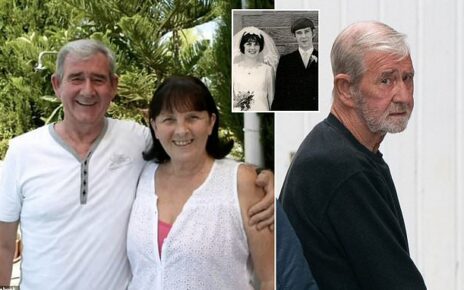Save articles for later
Add articles to your saved list and come back to them any time.
There’s a community garden in Belgrave that is often set upon at night by an unknown person.
Vandalism is a curse on our suburbs, but this visitor doesn’t drop rubbish, pull out plants and spray graffiti. Instead, they have proved to be a green-thumbed force for good.
Friends who dig this place: Belgrave Food Garden volunteers Chethi Abayawardana (left) and Ellie McSheedy.Credit: Paul Jeffers
Ellie McSheedy, president of the Belgrave Food Garden, has arrived some mornings to find the secret gardener has pulled out weeds, fixed trellises and neatly tied wayward tomato plants to stakes.
She has no idea who it is, and so the plot thickens. But whether it’s a shift worker, an insomniac or someone who’s not a people person, it doesn’t matter, McSheedy says.
“They do a fabulous job and we’re really grateful.”
The overnight gardener is among more than 40 volunteers converting this neglected public land, behind Cameo Cinemas on Burwood Highway in Melbourne’s outer east, into a free living pantry that anyone can pick from.
The garden was neglected and overgrown when McSheedy first came across it two years ago.Credit: Ellie McSheedy
When McSheedy first spotted the abandoned garden in 2021, on walks during the COVID-19 pandemic, it was choked with weeds and rubbish.
Helped by donations of tools, plants and a shed from local businesses, and a $4500 Yarra Ranges Council grant, she and a team of volunteers got to work.
As well as being open to be picked from, the garden’s produce is also given out at Belgrave Library and by the Dandenong Ranges Emergency Relief Service.
On Sunday, National Tree Day, 60 volunteers planted 600 edible indigenous plants funded by a grant from environment organisation Planet Ark.
The graffiti-strewn and weed-filled garden in 2021.Credit: Ellie McSheedy
The event was one of 1500 National Tree Day events held across Australia.
Sunday’s plantings launched Belgrave Food Garden’s new food forest, which will expand the project’s area tenfold into adjacent public land.
McSheedy says as well as addressing local food insecurity and climate change, the garden is a social hub.
Most volunteers at twice-monthly working bees are young families or professionals, many of whom recently moved to the area, have a yard at home and want to learn how to grow things in it.
“They also want to be part of the community, but it’s hard to do that. You have the desire, but how do you go about it? So this has been an easy way for people to get to know each other.”
McSheedy, a Welsh immigrant, knew no one apart from her partner and daughter when they moved to Belgrave five years ago.
Among her new friends is a fellow volunteer, Sri Lankan immigrant Chethi Abayawardana, who moved to Belgrave with her husband and son two years ago, also not knowing any locals.
Abayawardana enjoys contributing to the community as the garden’s treasurer, and in return has learnt how to plant and harvest food at her home such as coriander, chillies, tomatoes and silverbeet.
“There’s a sense of happiness, when you grow something and manage to harvest and eat it, rather than going to the supermarket,” she says.
McSheedy is heartened by feedback she gets from locals “that we’re doing a great job, that it’s brightened up a corner of the township”.
One woman told her that picking veggies from the garden was a lifeline because she often ran out of funds to buy food.
A teenage volunteer says he now wants to study horticulture when he grows up. One visitor decided to set up a similar garden in her inner-eastern Melbourne suburb.
“I encouraged her to do exactly that,” McSheedy says. “Which is great. I said, ‘You don’t have to be perfect, just go for it.’ ”
The Morning Edition newsletter is our guide to the day’s most important and interesting stories, analysis and insights. Sign up here.
Most Viewed in National
From our partners
Source: Read Full Article






